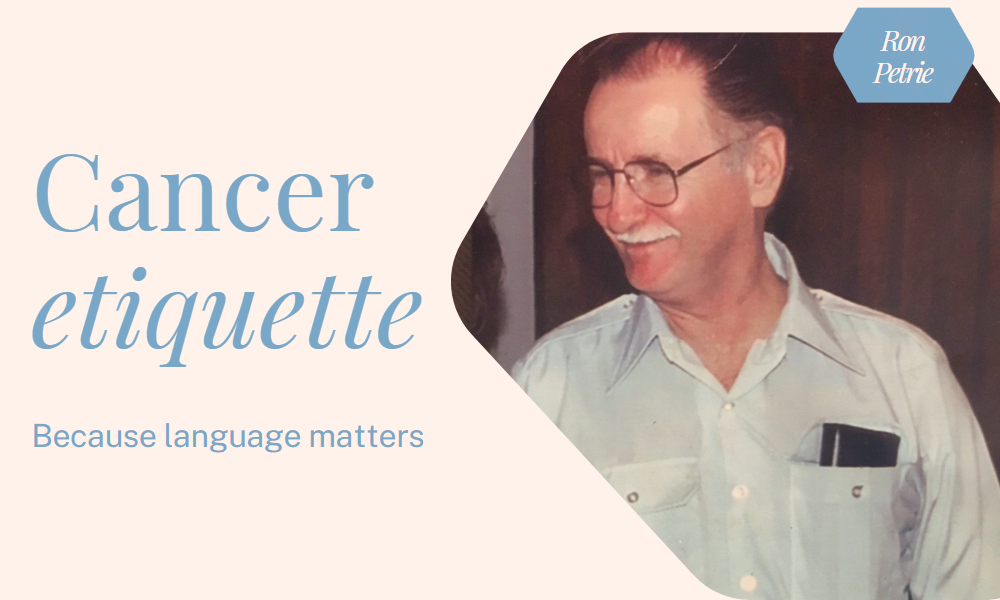
Cancer Etiquette: Language can make a difference for cancer patients
“The babble of some people is like sword thrusts, but the tongue of the wise is healing” (Prv 12:18).
“The babble of some people is like sword thrusts, but the tongue of the wise is healing” (Prv 12:18).
In 2017, my beloved husband Dan died of cancer. During his illness I observed him, plus other patients’ and family members, and was inspired to write the following article, which has appeared now in several publications.
“Mr. Smith, you have lung cancer.” The doctor compassionately announces to his patient. The biopsy has delivered its verdict. The patient and his loved ones must now deal with this devastating blow.
Cancer! Tumor! Even today, these two words conjure up fear, hopelessness and pain. The patient’s heart pounds, and life stands still for an instant. Each time they’re spoken, the stricken person is forced to relive his initial reaction.
“Cancer treatment has come a long way,” each well-meaning staff member counsels the patient.
“Your tumor is shrinking, Mr. Smith,” the doctor optimistically advises after reading the latest blood test.
The patient’s adrenaline spikes, and his heart races faster. Have you heard the story of the husband who fell to the floor and suffered a stroke in a major hospital after a doctor announced, “Your wife has cancer”?
How many times has a family member repeated a tragic cancer story told to him by his father or his father’s father through the years? These tales of dread remain embedded in that special place we hide all unpleasant thoughts hoping they will someday disappear.
Each time these words slip from a staff member’s lips the hope the patient has gained thus far sinks just a little bit lower.
The Greek physician and father of medicine, Hippocrates (460-370 BC), coined the terms carcinos and carcinoma to describe the non-ulcer and ulcer-forming tumors. In Greek, these words mean crab, as the finger-like spreading projections of cancer seemed to resemble the sea creature’s appearance.
The treatment and hopes of a cure of this major illness have progressed beyond our imagination since that time. Aren’t we ready to gently update its vocabulary with our current wisdom for the sake of the healing patient?
The words “your cancer” can be tenderly replaced with the words “your illness.”
The phrase “your tumor” can compassionately be substituted with the phrase “your unhealthy cell mass” after the doctor has advised the patient and his loved ones of his illness.
It is unlikely anyone will forget the initial diagnosis. It is the limited wisdom of a 70-year-old wife of a recently diagnosed cancer patient that suggests: the patient also requires emotional healing time to assimilate this life changing event.
These two short words need not be repeated over and over. Although spoken with compassion, the result is the same — drizzling hot oil onto an otherwise healing wound and prolonging its pain, the antithesis of today’s advanced miraculous medical profession.
With genuine concern for patient, doctor and staff, I remain,
A Loving Wife,
Lillie Petrie
As my faith and healing journey continued, in 2020 I attended a seminar sponsored by the Order of Malta in conjunction with the Diocese of Charleston. The topic of discussion was a review of the theological and practical application of Catholic teaching on end-of-life care.
Included in the package of information handed out was Father Jeffrey Kirby’s book entitled We Are the Lord’s: A Catholic Guide to Difficult End-of-Life Questions.
This book is a must read. As a result of going through Father Kirby’s insightful book, I’ve come to realize, a bit too late, how crucial it is for a loved one assisting in end-of-life issues to be knowledgeable and prepared to help a patient die with dignity.
As We Are the Lord’s states, “In discerning medical treatment and care, therefore, we have to be cautious not to isolate the soul from the body, or the body from the soul. The care we receive from others must consider both these portions of our personhood.”
I remember that as I sat at my husband’s side in the hospital, the attending physician stood in front of his bed and loudly said, “He’s dealing with fear!”
Since it is known that hearing is one of the last sensory perceptions to end, I rose from my chair, took the physician’s arm and led him to the door of my husband’s room.
“My husband is NOT AFRAID OF DEATH,” I said firmly.
It is my hope that more people become aware of the availability of excellent literature, written by Father Kirby and others, on this subject and resources that are being provided by the Diocese of Charleston.
I share with you a quote from the last chapter in the book:
“In our brokenness and vulnerability, as we take on a portion of our loved one’s sufferings, we are not alone. Our Lady is with us. She is showing us what to do. And we are called to do our best.”
Lillie Petrie is a native of New York and currently a resident of Fort Mill, where she attends St. Philip Neri Church. She is president of the Legion of Mary, St. Mary Presidium there. Email her at lil519p@gmail.com.
